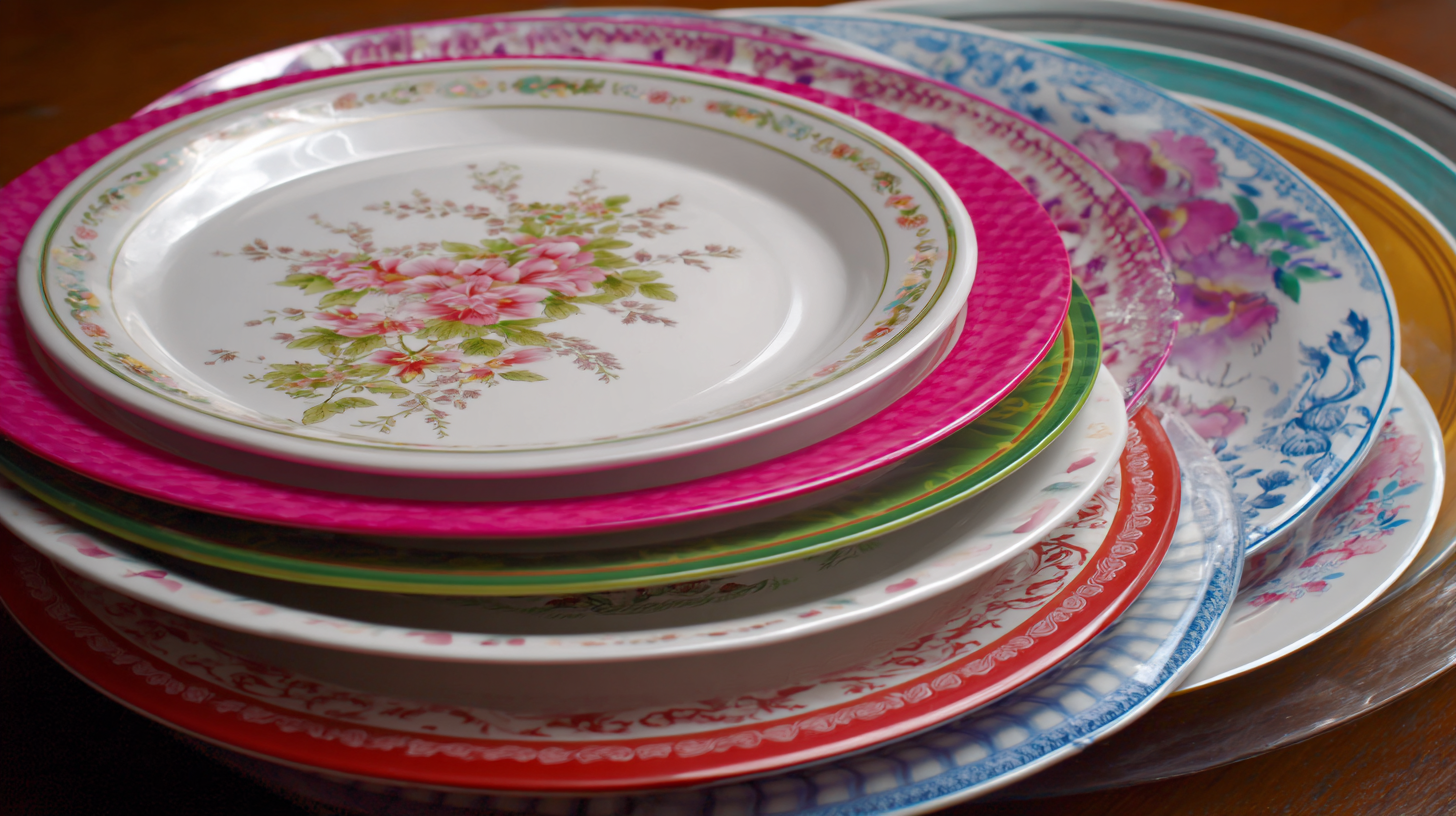Leave Your Message
In today's global marketplace, the demand for high-quality disposable tableware has grown exponentially, with Paper Plates Chinet leading the way in innovation and sustainability. Understanding the intricacies of import and export certification is crucial for manufacturers and distributors aiming to navigate this competitive landscape effectively. This guide delves into the essential steps necessary for obtaining certifications that not only comply with international regulations but also enhance the reputation of Paper Plates Chinet as a premium choice for environmentally conscious consumers. By focusing on the quality craftsmanship of "精工细造,中国制造,服务世界", we will explore how proper certification can unlock opportunities in global markets, ensuring that businesses not only meet but exceed customer expectations worldwide. Whether you're an established supplier or a newcomer to this dynamic industry, this step-by-step guide provides valuable insights into the certification process, helping you to ensure the success of your Paper Plates Chinet enterprise.

Navigating the landscape of import-export certification for Chinet paper plates can be fraught with challenges. According to industry reports, the global disposable tableware market is projected to reach $20 billion by 2025, driving demand for efficient certification processes. However, complexities arise due to varying regulations in different markets and the necessity for compliance with stringent health and safety standards. Companies must be prepared to invest in legal expertise and training to successfully traverse this intricate framework.
To mitigate these challenges, businesses should implement a systematic approach to certification. Here are some tips: First, stay updated on local and international regulations that affect your products. Regularly consulting resources like the International Organization for Standardization (ISO) can provide valuable insights into compliance requirements. Additionally, consider working with a certified consultant who specializes in import-export certification. Their expertise can guide you through the documentation and processes needed to ensure your products meet market standards, ultimately facilitating smoother transactions.
Another critical aspect is quality assurance. Ensuring that your Chinet paper plates comply with safety certifications, such as FDA approval or ASTM standards, can significantly reduce the risks associated with product recalls or legal challenges. Investing in rigorous testing and certification will not only enhance your product's credibility but also foster trust with customers and partners globally.
 When it comes to the import and export of Chinet paper plates, understanding key regulations is crucial for businesses aiming to navigate international markets efficiently. Different countries have specific standards that products must meet, particularly concerning food safety and environmental sustainability. For instance, importing paper plates into the EU requires compliance with regulations surrounding food contact materials, while in the U.S., the FDA sets guidelines that manufacturers must adhere to ensure product safety.
When it comes to the import and export of Chinet paper plates, understanding key regulations is crucial for businesses aiming to navigate international markets efficiently. Different countries have specific standards that products must meet, particularly concerning food safety and environmental sustainability. For instance, importing paper plates into the EU requires compliance with regulations surrounding food contact materials, while in the U.S., the FDA sets guidelines that manufacturers must adhere to ensure product safety.
Tip: Always stay updated on the latest regulations by checking official government websites or industry associations to avoid costly compliance issues.
Moreover, documentation plays a vital role in the importing and exporting process. Essential papers such as import/export permits and Certificates of Compliance should be prepared meticulously to facilitate a smooth transition through customs. In many cases, the required documentation may also include proof of sustainability claims, especially for products marketed as eco-friendly.
Tip: It can be beneficial to engage a customs broker who has experience with paper products to ensure that all necessary paperwork is correctly filled out and submitted on time.
Securing import-export certification for products like Chinet paper plates is a crucial step for businesses aiming to expand their market reach. The process begins with understanding the specific requirements set by government authorities in both the exporting and importing countries. Companies must gather all necessary documentation, such as product specifications, safety data sheets, and compliance certificates. It is essential to ensure that the products meet international quality standards and regulations to avoid potential delays or rejections during the certification process.
Once the documentation is prepared, businesses should submit their application to the relevant regulatory body. This step often involves paying a certification fee and may require an inspection or sampling of the products by government officials. Being thorough and organized during the application will facilitate a smoother approval process. After obtaining the required certification, companies can confidently engage in international trade, knowing that their products meet the necessary regulations for both safety and quality.
This chart illustrates the steps involved in obtaining an import-export certification for paper plates, along with the estimated time required for each step. Understanding these steps helps streamline the certification process.
When it comes to obtaining certification for paper plates, many businesses often overlook critical details that can lead to costly setbacks. One of the most common mistakes is failing to align with the latest industry regulations. According to a recent report from the National Association of Food Service Manufacturers, over 30% of manufacturers reported issues with compliance due to insufficient understanding of certification processes. This not only delays product launches but can also tarnish a brand's reputation in the highly competitive disposable goods market.
Another prevalent error is underestimating the importance of documentation. Many manufacturers neglect proper record-keeping or provide incomplete materials during the certification process. Statistics show that approximately 25% of certification applications are rejected due to inadequate documentation. Understanding what documents are required and ensuring they are thoroughly prepared is essential. Additionally, engaging with certified experts or consultants can greatly reduce the risk of these mistakes, allowing manufacturers to navigate the complex landscape of import-export certification more effectively while focusing on delivering quality products like Chinet paper plates.
| Certification Type | Description | Common Mistakes | Steps to Avoid Mistakes |
|---|---|---|---|
| FDA Certification | Ensures the safety of products intended for food use. | Incomplete documentation submission. | Double-check all forms and ensure complete submissions. |
| CE Marking | Indicates compliance with health, safety, and environmental protection standards for products sold within the EEA. | Misunderstanding product category requirements. | Review specific requirements based on product classifications. |
| ISO Certification | Defines the standards for quality management systems. | Lack of continuous improvement processes in place. | Implement regular audits and feedback mechanisms. |
| BRC Global Standards | Ensures the quality and safety of food products. | Ignoring the importance of training staff on protocols. | Conduct regular training sessions on compliance standards. |
| USDA Organic Certification | Guarantees organic farming practices and raw materials. | Insufficient record-keeping of organic materials. | Maintain detailed logs of all organic materials used. |
In the global market, proper certification plays a critical role in promoting the sales and acceptance of eco-friendly products, such as paper plates. The benefits of obtaining the right certifications for
Chinet paper plates extend beyond compliance; they enhance marketability and consumer trust. Certifications such as the Certificate of Origin (CO) authenticate the source of the products, ensuring consumers that they are purchasing goods that adhere to certain safety and environmental standards. This is particularly important as the demand for sustainable disposable tableware continues to rise, driven by an increasingly eco-conscious consumer base.
Moreover, adherence to good agricultural practices enhances the credibility of products like Chinet paper plates. By emphasizing sustainable materials and processes, manufacturers can address growing concerns over the use of agrochemicals and their impact on health and the environment. With the eco-friendly paper plates market expected to witness substantial growth by 2035, businesses that invest in proper certification not only comply with international trade regulations but also position themselves favorably in a competitive landscape. This strategic move can lead to increased exposure in global markets and stronger connections with consumers seeking sustainable alternatives.

